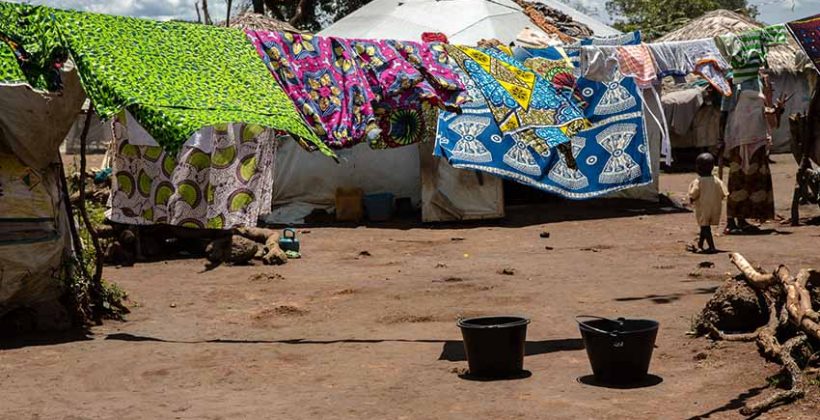As the COVID-19 pandemic spread, those at greatest risk included around 30 million refugees and asylum seekers, more than 80% of whom live in low- and middle-income countries with weaker health systems and pre-existing humanitarian crises.

Asylum seekers and refugees face additional risks to their health, protection and resilience and challenges in accessing their rights and pre-existing challenges, including exclusion from essential public services, social protection systems, economic opportunities and financial services, may also have intensified these risks since the beginning of the pandemic.
State interventions in response to the pandemic have ranged from placing significant restriction on population movement and economic and social interactions, to – in some cases – denial of the scale of the problem and reluctance to act. Compounded with underreporting, misinformation and difficulties of conducting on the ground research the full scale of the impact of the pandemic on asylum seekers and refugees is currently poorly understood and likely understated.
To better understand the true impact of the pandemic on the protection of fundamental rights of refugees and how widespread the challenges are, Itad and Valid Evaluations have been commissioned by the COVID-19 Global Evaluation Coalition to carry out the Joint Evaluation of the Protection of the Fundamental Rights of Refugees during the COVID-19 Pandemic.
The evaluation will look at how effective the collective response has been so far and identify emerging good practices, innovation and adaptations that can be carried forward.
Based on the project’s inception phase (May to June 2021), we have identified five key areas where refugee rights have been impacted under COVID-19.
Preliminary observations in the inception report outline the following:
1. The right to seek and enjoy asylum
Movement restrictions and lockdowns have, in many cases, resulted in discriminatory practices which compromise the rights of refugees. Border restrictions imposed by countries during the pandemic have limited access to territory and asylum, in ways that appear to contravene international human rights and refugee protection standards, including the principle of non-refoulement. COVID-19 public health orders have also been used by certain governments to further anti-refugee and anti-migrant agendas. With varying degrees of severity to date, and with fluctuations and unpredictability, the effects have impacted countries irrespective of wealth and level of development.
The evaluation will assess the impact of these practices and review international response efforts to promote access to territory and asylum-procedures.
2. The right to health
The majority of refugees are hosted in low and middle-income countries where there are often barriers to adequate health services. In high-income countries, refugees have often less access to primary healthcare services than citizens and encounter communication challenges, discrimination and fear of deportation if accessing healthcare services.
Our evaluation will focus on the effects COVID-19 has had on refugees’ access to health services and the extent to which international cooperation has advocated for the inclusion of refugees within their national responses to COVID-19.
3. Protection against Gender-Based Violence (GBV)
Reported incidents of GBV have risen dramatically since the start of the pandemic. By the end of 2020, nearly all of the GBV coordination mechanisms operating across 27 refugee settings reported moderate to extreme risk of GBV among the populations they served. Movement restrictions have kept women and girls in close proximity to abusive partners, and loss of employment or income put women at higher risk of sexual exploitation and abuse. Overall, gender inequality has been exacerbated by the pandemic, rolling back gains for women and girls and in many parts of the world deepening gender inequalities that contribute to GBV.
We will collect evidence on interventions designed to prevent GBV among refugees, including awareness-raising campaigns, GBV training frontline health workers, judicial officials and police.
4. Child protection
The closure of borders and travel restrictions have hampered the family reunification of unaccompanied and separated children. Additionally, the lack of access to education and other essential child protection services has had detrimental impacts on children’s development, safety and well-being.
We will assess the current protection of refugee children and the effectiveness of advocacy, fundraising, community-based responses and programmes addressing key child protection risks.
5. Right of access to information
Access to accurate and clear information has been considered lifesaving for refugees, particularly considering the ever-evolving measures to contain the spread of the virus. However, refugees face a number of barriers that hinder access to that information, including language and limited access to technology.
Our evaluation will gather data on the level of access refugees and asylum seekers have to information and the availability of factual and relevant information and two-way communication enabling refugees to share their feedback, ideas and engage in the COVID-19 response.
To promote better practice going forward, and further mobilise existing successes from responses to the pandemic, findings from our evaluation will be presented at the High-Level Officials Meeting in December 2021. The meeting is the first gathering of senior government officials and representatives of the international community to review progress under the Global Compact on Refugees and an opportunity to ensure the protection of rights for asylum seekers and refugees is at the forefront of pandemic recovery efforts.
The evaluation represents an ambitious undertaking, particularly given we are working within a tight timeframe and ever-evolving, ongoing pandemic. As such, a Management Group formed by the Evaluation Units of UNHCR, Ministry of Foreign Affairs of Finland, Governments of Columbia and Uganda and the humanitarian systems network, ALNAP, will provide guidance and support to the evaluation team.
To discuss the project further, please contact: Elisa Sandri, Itad Project Manager
Learn more about our work with refugees here.
Image: The Sanitation and Hygiene Fund via Flickr (CC BY 2.0)

